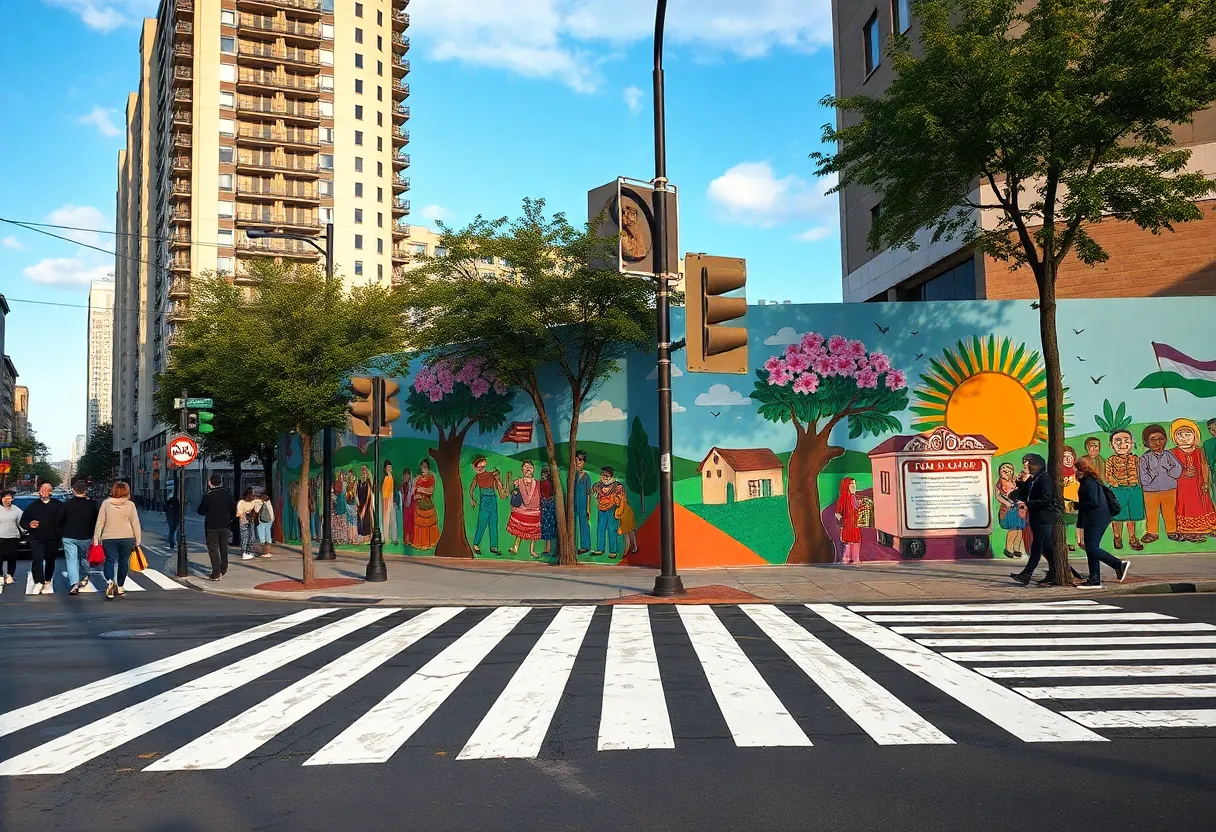News Summary
A new Florida law jeopardizes decorative crosswalks and street murals, raising concerns in cities like Tampa and St. Petersburg. The Florida Department of Transportation (FDOT) has advised against non-standard surface markings, citing safety risks. Communities are worried about the potential removal of significant cultural art installations, which advocates argue are essential for representation and visibility, particularly for marginalized groups. Critics of the law call it an overreach that may undermine local art initiatives and community expression.
Tampa, Florida — A new law in Florida is putting decorative crosswalks and street murals in jeopardy, heightening concerns in cities like Tampa and St. Petersburg. The law, enacted as part of Senate Bill 1662, focuses on ensuring uniform compliance among state transportation facilities and may lead to the removal of vibrant community art installations.
The Florida Department of Transportation (FDOT) issued a memo on June 30 that advises against non-standard surface markings, stating that they may distract drivers and compromise safety for both motorists and pedestrians. This guidance comes on the heels of recently controversial decisions, including the removal of a rainbow crosswalk in South Florida.
As part of its review, FDOT is assessing the implications of decorative crosswalks and street murals. One notable example under scrutiny is the Progress Pride crosswalk located in the Kenwood neighborhood of St. Petersburg, along with the “Black History Matters” mural outside the Woodson African American Museum of Florida. The removal of these installations could have a significant impact on how communities express their values and identity.
Residents and local advocates have voiced their concerns regarding the this new directive. Many argue that these artistic installations hold cultural significance and contribute positively to community representation. For instance, local advocates for LGBTQ rights emphasize that rainbow crosswalks foster acceptance and visibility for marginalized groups.
Moreover, the FDOT’s directive indicates that political messages and artworks should be absent from public roads to maintain safety standards, drawing criticism from various community members. Critics assert that there is no substantial evidence linking decorative designs to traffic safety issues. Additionally, the U.S. Department of Transportation has echoed calls for caution regarding these installations.
Notably, a study conducted in Florida found that decorative crosswalks could actually lead to safer driving behavior, noting decreases in instances of drivers running stop signs and an increase in compliance with stop signals at intersections. As a result, some community members view the new law as an overreach that disregards the potential benefits of local art initiatives.
Though FDOT has begun its evaluation, it has not released a list of non-compliant crosswalks or provided a timeline for when enforcement measures might begin. The law comes with implications for funding, as non-compliant cities may face the withholding of state funds. This aspect of the law has generated apprehension among city officials who rely on state support for infrastructure funding.
Additionally, Equality Florida, an organization advocating for LGBTQ rights, criticized the FDOT’s memo for its ambiguous wording, which could lead to widespread bans on various forms of culturally significant pavement art. The potential elimination of such artistic representation may stifle expressive public art initiatives across the state, further marginalizing local communities.
FDOT Secretary Jared Perdue has underscored the intention of the new law, aiming to keep transportation facilities devoid of political ideologies. However, this stance has led to fears that community murals honoring important cultural histories, such as those celebrating Black heritage or LGBTQ milestones, will be adversely affected.
The continued evaluation of decorative crosswalks and street murals by FDOT reflects a growing tension between maintaining safety standards on public roadways and preserving the rich tapestry of community expressions in Florida’s cities. As the situation evolves, stakeholders across Tampa and St. Petersburg are left to navigate the uncertain future of their artistic landmarks.
Deeper Dive: News & Info About This Topic
HERE Resources
St. Petersburg Faces Threat to Street Murals Reflecting Diversity
St. Petersburg Launches Enhanced Road Safety Program
Concerns Rise Over Impaired Driving Incidents in St. Petersburg
New Connected Community Bus Network Launched in St. Petersburg
Community Workshops Drive Improvements for St. Petersburg’s Deuces Corridor
St. Petersburg Residents Confront Safety Concerns Following String of Pedestrian Incidents
St. Petersburg Prepares for a Community Mobility Revolution
St. Petersburg Improves Transportation Access
St. Petersburg Intersection Closed Indefinitely Due to Water Main Leak
St. Petersburg Welcomes New City Council Leadership and SunRunner Station
Additional Resources
- WTSP News
- Wikipedia: Crosswalk
- Fox 13 News
- Google Search: Florida Department of Transportation
- Watermark Online
- Google Scholar: crosswalk safety Florida
- ABC Action News
- Encyclopedia Britannica: Crosswalk
- Axios
- Google News: Florida crosswalk legislation

Author: STAFF HERE PETERSBURG WRITER
The ST PETERSBURG STAFF WRITER represents the experienced team at HEREStPetersburg.com, your go-to source for actionable local news and information in St Petersburg, Pinellas County, and beyond. Specializing in "news you can use," we cover essential topics like product reviews for personal and business needs, local business directories, politics, real estate trends, neighborhood insights, and state news affecting the area—with deep expertise drawn from years of dedicated reporting and strong community input, including local press releases and business updates. We deliver top reporting on high-value events such as Grand Prix of St. Petersburg, Localtopia, and SHINE Mural Festival. Our coverage extends to key organizations like the St. Petersburg Area Chamber of Commerce and St. Pete Downtown Partnership, plus leading businesses in finance, manufacturing, and healthcare that power the local economy such as Raymond James Financial, Jabil, and Bayfront Health St. Petersburg. As part of the broader HERE network, including HEREJacksonville.com, HEREOrlando.com, HERETallahassee.com, and HERETampa.com, we provide comprehensive, credible insights into Florida's dynamic landscape.





